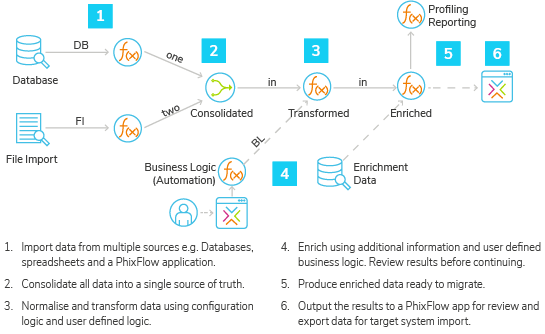Global data migration for leading telco infrastructure provider.
Independent telco infrastructure provider migrates data from 25 business units to Microsoft Dynamics 365.

Project overview.
One of the world’s largest independent Telco infrastructure providers contacted PhixFlow to help migrate data for 25 business units, each with 12+ operational areas, across 5 countries.
With the businesses in each operational country using a combination of proprietary solutions, manual spreadsheets and Navision, the goal for the Telco was to champion a move for all business units to switch onto a consistent business process model operating on Microsoft Dynamics 365. This would help drive improvement in the acquisition, management, and construction of critical national infrastructure, improve visibility of activity globally and increase accuracy in all operational areas.
The accurate and timely migration of the data was the cornerstone to the success of the business initiative. Initially the project was undertaken using SQL and spreadsheets with sophisticated functions to manually apply corrections, add improvements and make alterations. While a level of success was achieved with a small pilot business unit, the telco identified this approach would not scale for larger, more complex sites as it was slow to produce results and lacked the assurance of accurate reconciliation.
PhixFlow was contracted to deliver a migration solution that could be rolled out globally, provide assurance of the results and satisfy auditors.
Project highlights.
5
Data was successfully migrated in all 5 countries.
2
d.Acceptance testing was completed in just a few days enabling the solution to go live successfully in each country.
4
wks.Deployments were typically completed in 4 weeks once the initial template was created.
The challenge.
The telco had challenging timelines to complete their global data migration, requiring a partner to operate alongside the internal team and facilitate the successful completion of the ambitious project. Each location in the migration project had a fixed date where the existing operational systems would be decommissioned and replaced with the new solution.
This meant the data migration had to be swift, accurate and reliable as any delays would have a detrimental impact on operations and incur significant cost penalties. Further to this, it would later be discovered that business units would need to make critical last-minute alterations and overrides. Therefore the migration solution was required to handle this without delaying the delivery.
The data needed to be transformed to fit the new solution. Also, the telco wanted to take the opportunity to introduce a number of data enrichments such as increased categorisation of assets.

The solution.
Drawing on the PhixFlow consultancy team’s expertise and experience of migrating data, the initial steps were centred on working closely with the telco to obtain a deep understanding of the project, data and challenges being faced. The solution was then designed at a high level to utilise a modular approach that would enable much of the solution to be reused as a template for all deployments. The most complex element was the extraction and transformation of data into a normalised state before being passed through modules used to prepare the data for ingestion to the target system. The aim was to create a reusable template – 80% Reusable / 20% Tailored – configuration to suit the needs of each business unit.

The approach was centred around the following objectives:
To Increase,
- Accuracy of data
- Data consistency
- Traceability of changes
- Speed to produce results
and to decrease,
- Configuration time
- Consultancy costs
- Risk
- Overall delivery time
Leveraging PhixFlow’s powerful analytics engine our consultants were able to consolidate data from multiple sources and profile it to gain insight, identify data quality issues such as incomplete data, hidden relationships between data items and validate the accuracy of the current understanding. This improved the overall understanding of the legacy data for all through clear metrics displayed in a secure PhixFlow application that could be shared with the telco.

Continual data improvement process.
The initial step in processing, where an understanding of the data is obtained. This understanding is critical before the process of extracting data can commence.
Creating information involves sorting data, processing and presenting it in a format which brings substance to that data.
Formation of the whole picture surrounding each piece of data to provide it with context and meaning that facilitates its accurate use.
Sufficient knowledge and expertise have been gained to accurately judge the data. It is achieved through study and careful interpretation of knowledge derived from data.
Several iterations ensured the data was enriched, improved, and reviewed until the output data was optimal. Automated profiling was then introduced into the template solution to capture data quality issues, both expected and unexpected, for all deployments before the data was exported.
The cycles of review and enrichment were factored into the deployment to maintain high quality results. This, combined with PhixFlow proactively capturing issues at the earliest possible stage, enabled the PhixFlow consultants to return queries to the business much quicker, led to faster resolution times.

Fixing insufficient data.
Whilst categorising customers based on their tax code it become apparent that much of the data, extracted from multiple sources, had missing or insufficient data. To resolve this PhixFlow was, based on business rules, able to automatically identify the missing or insufficient data and present it within a report to the customer team. Then, once the required information was provided, the results could be retested within minutes to confirm the resolution and accuracy of the data.

The modular approach provided the flexibility and structure necessary to support such a complex deployment. In certain circumstances data overrides, bespoke data sources and forced exports were needed.
For example, if data did not satisfy the export criteria but the business wished to keep it, it was not always possible to resolve issues in the source system in a timely fashion, so an override would be necessary that allow the release of these records i.e. specific assets which had been marked as expired but were required for posterity.
The solution design and PhixFlow’s ease of configuration meant that these bespoke alterations could be accommodated easily and still be accounted for when reconciling the results.

Unstructured data and fuzzy logic.
The telco had complex needs surrounding its fixed assets. As part of the drive for an improved operational model the assets needed to be sub-categorised to improve visibility. The challenge for the telco was that an unstructured, manually entered description field was the primary source of data used to derive the sub-categories.
The task was too labour intensive for a team to resolve in time for the project cut over, so PhixFlow was asked to assist.
Using a combination of business data, propositional logic and fuzzy logic, the free text field was interrogated, and a sub-category derived. In a small percentage of cases PhixFlow actually identified errors in the original categorisation of assets and highlighted these to the business.

Global deployment.
Below is an simplified illustration of the templated approach used:

PhixFlow’s iterative approach provided a high level of confidence in the data quality, which was further strengthened by performing trial runs of the exported data into a test Microsoft Dynamics 365 system. This ensured all systems functioned in synergy and that the data satisfied requirements. It also offered the opportunity for the business to verify results.
Managing transactional data prior to cut over – In the larger countries the systems were migrated ahead of time with the delta data transferred on the final cut over weekend. This greatly reduced risk and minimised costs associated with overtime.
Reconciliation reporting.
With the data exported from PhixFlow and imported into Microsoft Dynamics 365, PhixFlow produced reconciliation reports to validate the export of all records. The reports traced the records through key touch points in the processing lifecycle, from initial collection, normalisation, through to export and then verified against all records present in the new system.
The report listed where records were removed and supporting information enabled a quick investigation as to the validity of the removal (or inclusion). The reports were generated in a matter of minutes, for each functional area, and provided valuable reassurance to all parties that all data was exported correctly.
Continual improvement is of paramount importance at PhixFlow, and that’s why after each deployment the template was reviewed in line with lessons learnt. This allowed the PhixFlow consultants to update the template with any improvements, such as enhanced profiling to capture data issues earlier in the cycle to further improve the process for the following countries in the migration.

The results.
The telco team and the PhixFlow consultants worked closely together to ensure that the data migration satisfied both the business and auditor requirements. Through a focus on understanding the business and the utilisation of PhixFlow’s powerful analytics engine the telco data was successfully migrated in all 5 countries.
Deployments were typically completed in 4 weeks once the initial template was created, including trial runs of the migration, i.e. after the initial data extracts were completed. Deployments were completed over a long weekend and because the users were engaged throughout the process, acceptance testing was completed in just a few days, enabling the solution to go live successfully in each country. The project was so successful at migrating the data an additional country was added that had previously been scheduled for an internal migration.

More great customer success stories.
Prepay Billing Platform Migration Reconciliation Solution
VIVA Bahrain (now Saudi Telecom) were in the process of migrating their prepay Service Control Platform (SCP) to a new Huawei Central Payment System (CPS) and needed to independently verify that the migration was correct.
T-Mobile billing system migration
T-Mobile, one of the world’s leading mobile communications companies, needed to migrate their wholesale billing system, due to be unsupported by the vendor, leaving the business exposed should any problems arise with the system.
Integrated asset management solution
A leading telecommunications provider turned to PhixFlow to build a bespoke asset management solution to ensure the accurate recording a tracking of equipment across multiple continents.